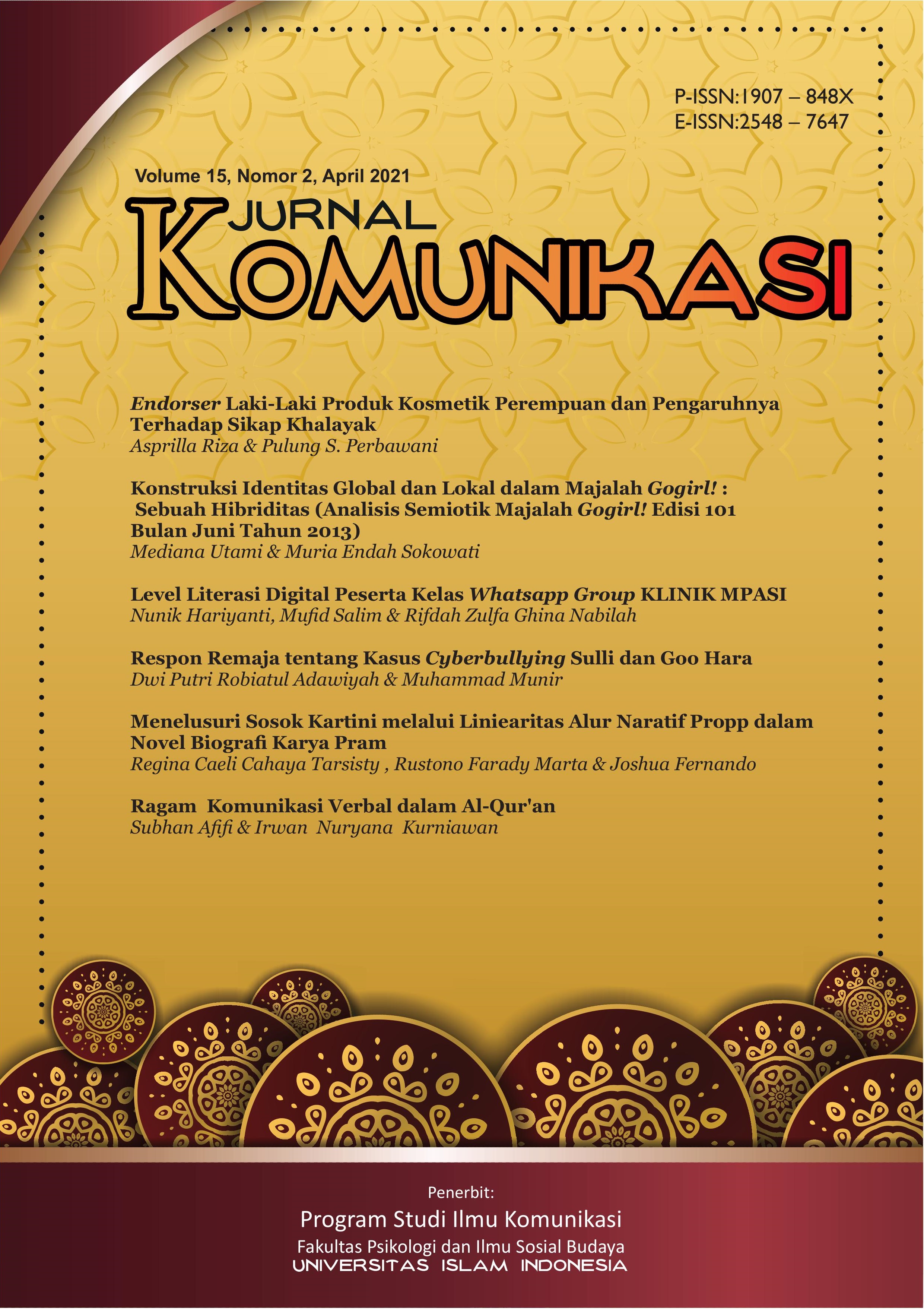Main Article Content
Abstract
Abstract. Gender discrimination in Indonesia has existed since ancient times. As a Javanese woman, Kartini became a figure who experienced the past and even by her family. Due to her limitations, Kartini wrote about her restlessness and thoughts in the form of letters sent to her Dutch friends. The letters were then collected and put together into a book entitled Door Duisternis tot Licht. Pramoedya took some fragments of Kartini's letter, and tried to see Kartini in her literary glasses in the biographical novel Call Me Kartini Saja. Relying on qualitative methods and constructivist paradigms and using Vladimir Propp's narrative analysis, the purpose of this research is to reveal the description of the character's function in the narrative in the novel. The role analysis is only in narratives that contain elements of feminism. This research found that the novel P Call Me Kartini Saja contains seven of the 31 narrative functions and seven characters which are grouped into four character functions. Through the narrative function and character function that have been analyzed in this novel, this suggestion suggests that Kartini's spirit in fighting for emancipation through her writing and thoughts should always be lived out in her daily activities because her struggle allowed Indonesian women to indulge their rights.
Keywords: Liniearity, Kartini, Woman Emancipation, Gender Roles,
Vladimir Propp’s Narrative Analysis.
Article Details
Authors who publish with this journal agree to the following terms:
- Authors retain copyright and grant the journal right of first publication with the work simultaneously licensed under a Creative Commons Attribution License that allows others to share the work with an acknowledgement of the work's authorship and initial publication in this journal.
- Authors are able to enter into separate, additional contractual arrangements for the non-exclusive distribution of the journal's published version of the work (e.g., post it to an institutional repository or publish it in a book), with an acknowledgement of its initial publication in this journal.
- Authors are permitted and encouraged to post their work online (e.g., in institutional repositories or on their website) prior to and during the submission process, as it can lead to productive exchanges, as well as earlier and greater citation of published work (See The Effect of Open Access).
References
- Omara, A. (2004). Perempuan, Budaya Patriarki dan Representasi. Mimbar Hukum, II(46), 148–165.
- Putri, A., & Nurhajati, L. (2020). Representasi perempuan dalam kukungan tradisi Jawa pada film Kartini karya Hanung Bramantyo Film by Hanung Bramantyo. ProTVF, 4(1), 42–63.
- Rahayu, R. I., & Aprilia, I. R. (2018). Rekonstruksi Pemahaman Kebangsaan: Percakapan Tentang Perempuan dan Kebangsaan. Jurnal Perempuan, 23(3), 183–192.
- Rosemarie, P. T. (2004). Feminist Thought: Pengantar Paling Komprehensif Kepada Aliran Utama Pemikiran Feminis. Jalsutra.
- Sadono, T. P., & Chasanah, R. N. (2016). Kajian ilmu komunikasi pandangan dan harapan (studi eksploratif tentang pandangan dan harapan pembelajaran Ilmu Komunikasi pada mahasiswa 5 PTS di DKI Jakarta). Bricolage: Jurnal Magister Ilmu Komunikasi, 2(2), 93–104.
- Sakina, A. I., & Siti, D. H. (2017). Menyoroti budaya patriarki di indonesia. SHARE: SOCIAL WORK JURNAL, 7(1), 71–80.
- Septiani, A. (2017). IMPLEMENTASI NILAI-NILAI PERJUANGAN KAUM PEREMPUAN DALAM SURAT KABAR POETRI HINDIA 1908-1911. Jurnal Candrasangkala, 3(1), 43–52.
References
Omara, A. (2004). Perempuan, Budaya Patriarki dan Representasi. Mimbar Hukum, II(46), 148–165.
Putri, A., & Nurhajati, L. (2020). Representasi perempuan dalam kukungan tradisi Jawa pada film Kartini karya Hanung Bramantyo Film by Hanung Bramantyo. ProTVF, 4(1), 42–63.
Rahayu, R. I., & Aprilia, I. R. (2018). Rekonstruksi Pemahaman Kebangsaan: Percakapan Tentang Perempuan dan Kebangsaan. Jurnal Perempuan, 23(3), 183–192.
Rosemarie, P. T. (2004). Feminist Thought: Pengantar Paling Komprehensif Kepada Aliran Utama Pemikiran Feminis. Jalsutra.
Sadono, T. P., & Chasanah, R. N. (2016). Kajian ilmu komunikasi pandangan dan harapan (studi eksploratif tentang pandangan dan harapan pembelajaran Ilmu Komunikasi pada mahasiswa 5 PTS di DKI Jakarta). Bricolage: Jurnal Magister Ilmu Komunikasi, 2(2), 93–104.
Sakina, A. I., & Siti, D. H. (2017). Menyoroti budaya patriarki di indonesia. SHARE: SOCIAL WORK JURNAL, 7(1), 71–80.
Septiani, A. (2017). IMPLEMENTASI NILAI-NILAI PERJUANGAN KAUM PEREMPUAN DALAM SURAT KABAR POETRI HINDIA 1908-1911. Jurnal Candrasangkala, 3(1), 43–52.




